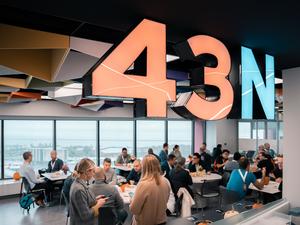AT&T has awarded funding to a company founded and led by a graduate student in the Naveen Jindal School of Management to develop a product that helps children learn STEM — science, technology, engineering and math — concepts while having fun.
Enrolled in the Double MS/MBA program, Rob DeSoto is also CEO and co-founder of Wildcards, a startup that develops fully functional circuit boards that teach children coding, electronics and engineering. Wildcards was recently accepted into AT&T’s Aspire Acceleratorprogram, which provides mentoring, funding and resources to startups that focus on educational technology. Wildcards is the first company from North Texas accepted into the program, which provides $100,000 in funding and a $25,000 grant.
Bryan Chambers, director of the Blackstone LaunchPad program at UT Dallas, encouraged DeSoto to apply to the accelerator program after he learned about Wildcards in class.
“Bryan has a sharp eye for talent, and, as is often the case, his instinct about Rob and the promise of his Wildcards proved to be right,” said Steve Guengerich, immediate past executive director of the Institute for Innovation and Entrepreneurship. “When we talk about our mission being to ‘enable the next generation’s new ventures,’ a big part of the enablement is connecting our student founders to organized people and money — in this case, experienced startup mentors and investors.”
DeSoto’s military background provided the foundation for his entrepreneurship. He served five years in the U.S. Navy as an aviation electronics technician and received training as a calibration technician. He worked on everything from missile systems on combat jets to electronics that control nuclear reactors — any combat and electronics system that required calibration or maintenance on a ship.
After he left active duty, he used his GI Bill benefits to earn an electrical engineering degree. He then took a job at Lockheed Martin and worked his way up to a test engineer technical lead position. He and a business partner wanted to start a business based on integrated circuit boards designed to be configured by consumers. They had plenty of ideas – 127, to be exact — but were having trouble finding a single viable one for business.
“I enrolled at UT Dallas because I wanted to get business experience,” DeSoto said. “The MBA and innovation and entrepreneurship programs have also helped me shake out my ideas and narrow them down.”
Madison Pedigo, a senior lecturer at JSOM, connected DeSoto with Gene Frantz, one of the designers of Texas Instruments’ iconic Speak & Spell, an educational toy from the 1980s that taught children how to spell using sound synthesis technology.
Frantz, DeSoto said, “suggested that we start smaller.”
That advice and his 7-year-old daughter’s request to learn what he did for a living helped DeSoto conceive the idea that would become Wildcards.
“What Gene had said started resonating with me — to come up with an idea that has impact on a smaller scale that’s not so lofty,” DeSoto said. “I thought, ‘This is what we should do. We should make a circuit board that I would want for my kids.’ ”
Serendipitously, he said, his business partner had built a circuit card with his daughter that very weekend. When they next met, they described their experiences to one another and knew they had come up with an idea that could work.
From there, DeSoto said, they did a market study and realized that there were already some great products on the market, but they were either too expensive or were too advanced for children. They had found their niche.
“We’re passionate about being fathers, and we’re passionate about electrical engineering — and engineering in general,” DeSoto said. “At that point, it was a no-brainer for us. We needed to make something that could make STEM learning more accessible.”
The system consists of a circuit board laid out in a way that is not intimidating to kids. It has a familiar USB connection that allows kids to plug the board into a computer or laptop and program it with intuitive, graphical software, DeSoto said.
The software is color-coded — each programming concept has its own color – and teaches users how to code without having to learn coding language from the ground up. The Wildcards website contains projects of various levels of difficulty including buzzers or light and sound sensors. One project connects the board to an apple that, when touched, can be used as an activator button. Another allows users to connect the board to a servo motor and build a catapult or a robot.
DeSoto said that, while difficult, it would even be possible to build a drone with a Wildcards circuit board.
“I volunteer at a coding club at my daughter’s school,” DeSoto. “We showed it to kids in the club and found that they are super interested,” DeSoto said. “It’s different from other STEM products. It doesn’t look like a toy; so kids don’t treat it like one. They view it as an educational product that they can build and learn on.”
The point of the product, DeSoto said, is to incite kids’ curiosity so that they engage with it. While they are working on projects, they are also learning problem-solving and critical-thinking skills. His goal is to get the product into STEM-focused classrooms, after-school programs and clubs. The product has entered into production, and DeSoto and his partner have been meeting with educators and distributors at conferences. They also have set up a Kickstarter campaign to break into the consumer and hobbyist market.
DeSoto said each class in both the MBA and innovation and entrepreneurship programs was crucial for helping him get his company off the ground. Everything from marketing to data analytics to global business has informed his approach to launch a technology company.
“I can’t think of a single class I’ve taken that I haven’t used some part of it in my business,” he said. “You have to set yourself up for success as best you can, and both of these programs have helped me do that.”
DeSoto’s message to budding entrepreneurs is that they maintain a level of excitement about everything they do.
“Some of it will be boring and mundane,” he said, “all of it is another puzzle piece” that helps build your company.
—Jimmie R. Markham




